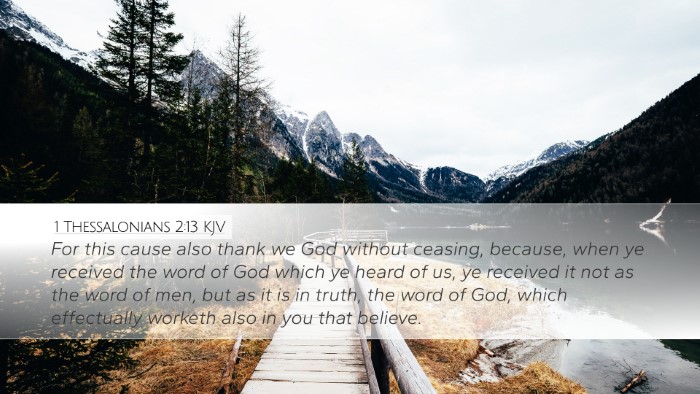In our message, THE WORD WORKING IN US (1 Thes. 2:13-20), we picked up our series again in the book of 1 Thessalonians after the holidays.
The Thessalonian Christians brought Paul and his missionary team joy in the way they “received” and continued to receive God’s Word (1 Thes. 2:13). “Word of God” is listed twice here for emphasis. The new believers there not only heard it with their ears but they took it to heart, welcoming it into their very souls because they knew it was “not… the word of men, but as it is in truth” from God (1 Thes. 2:13). Because they continued to receive God’s Word actively into their hearts, God continued to “effectively work” in them (1 Thes. 2:13). We also as God’s children need to value every Word of God to be equipped for the good works He has made us for (2 Tim. 3:16-17; Eph. 2:2; Mark 4:24; Luke 8:18; Job 23:12; Matt. 4:4; Heb 5:11-14; Luke 10:38-42; Ps. 119:14, 72, 127, 148, 162, etc.).
But hungering after God’s Word not only brought the Christians in Thessalonica joy, it also brought them suffering as they attracted enemies for doing good (1 Thes. 1:6; 2:14; 1 Pet. 4:16, etc.). Sometimes when we go through tense times of difficulty, we can become very self-focused and believe the lie that we are all alone. It is important to realize, as Christians, we are never alone (Heb. 13:5, etc.). All suffering, even things we bring upon ourselves (1 Pet. 4:15), God ultimately uses for good when we turn to Him (Rom. 8:28). In the case of the Thessalonian believers here, they were suffering “the same things” as the Christian churches in the land of Israel (1 Thes. 2:14). In the same way the Jews “killed… the Lord Jesus” the authorities in their city refused to receive the gospel message and have their sins forgiven; in the same way the Jews in Israel “killed… their own prophets,” the Thessalonian authorities killed those who brought God’s Word to them; and in the same way the Christian churches in Israel were “persecuted,” the Christian church in Thessalonica was afflicted (1 Thes. 1:6, 2:15a). This displeases God by working against the good of all mankind, which desperately needs salvation (1 Thes. 2:15b; Acts 4:18-19, etc.). By refusing salvation themselves and then not allowing others hear the message to be saved, they were filling “up the measure of their sins” and storing up “wrath…to the uttermost” (1 Thes. 2:16; Matt. 23:13; Rom. 2:5-6). The Greek word in verse 16 for “has come” in the NKJV is phthánō and means ‘to be beforehand, to anticipate or precede.’ God is speaking in certain terms He will pour His eternal wrath upon them unless they turn to Jesus for the forgiveness of sins like the Apostle Paul did (John 3:16-18). This “wrath” today is being “revealed from heaven” through various means like the human conscience given to all humanity made in His image, the Church, and His holy Word- the Bible, but one day it will be effective in “everlasting destruction” (Rom. 1:18; 2 Thes. 1:9). Christians, as God’s children, are not appointed to wrath (to include the “great tribulation” period yet to come when God begins to pour out His wrath on the world) because Jesus took the wrath of God in our place at Calvary (Rom. 5:9; 1 Thes. 1:10; 5:9; Matt 24:21-22; Ps. 2:10-12; 110:1-7; Rev. 6:16-17; 15:1; 16:1, etc.).
Paul with God’s love longed for the Christians in Thessalonica, but he had been forcefully “taken away” (lit. in the Greek- ‘orphaned’) from them (1 Thes. 2:17). He tried “time and again” (i.e. several times) to return to them, “but Satan hindered” (that is prevented or thwarted) him from being able to do so (1 Thes. 2:18). We see here the intense spiritual warfare Paul and the church in Thessalonica were engaged in (1 Thes. 3:5; 2 Cor. 4:4; Eph. 6:12, etc.). Paul had preached to them “in much conflict” (1 Thes. 2:2; John 10:10, etc.) following God’s direct call there (Acts 16:6-10), and as the Lord’s kingdom advanced, great spiritual opposition followed (Eph. 6:12, etc.). But Paul looked to the prize… his “hope… joy… crown of rejoicing” (1 Thes. 2:19a). The Apostle was confident the believers there (i.e. the “you” is emphatic in the Greek) would make everything worth it “in the presence of our Lord Jesus Christ at His coming” (1 Thes. 2:19-20).
Addendum
In the New Testament, there are two Greek words used for our English word ‘crown’- diádēma and stéphanos.
‘Diadem’ simply means ‘crown’ and is reserved for God alone who is “the only Potentate” Creator “of all things”- “the King of kings and Lord of lords” (1 Tim. 6:15; Rev. 4:11; 19:12, 16, etc.). [Although the Bible shows us “Satan” as “the ruler of this world” and “the prince of the power of the air” through the Fall of man (Gen. 3) TEMPORARILY claims this title in his vain attempt to usurp God’s authority (Isa. 14:12-14; John 14:30; Eph. 2:2; Rev. 12:3; 13:1, etc.), Scripture also is clear the enemy was defeated at the cross (Col 2:13-15, etc.), and he will be completely removed when Jesus returns and establishes His kingdom (Rom. 16:20; Rev. 19:12-20:3, etc.).] In this way, the first word for crown, ‘diadem,’ is NEVER used for Christians, but solely belongs to the LORD (Gen. 1:1-3; 1 Tim. 6:16; Isa. 46:9-10; Rev. 19:12, etc.).
A ‘stephanos’ crown, like the one mentioned by Paul in 1 Thessalonians 2:19, was ‘a prize,’ a wreath awarded to individuals in the public games who completed their race well (Heb. 12:1-2; 1 Thes. 2:2b, 12; 1 Cor. 9:24-27, etc.). Unlike the diadem, the Bible teaches stephanos crowns are reserved for Christians who choose to “walk in the Spirit,” letting the Lord live through them (Phil. 4:1; 2 Tim. 4:7-8; James 1:12; 1 Pet. 5:2-4; Gal. 5:16-18, 22-23, 25; Heb. 4:12-13; 1 John 1:9; 1 Cor. 11:31-32, etc.). These crowns are grace upon grace for God’s children as the Lord promises to “reward” His children for letting us “be filled” with Him (Heb. 6:10-12; 11:6b; 1 Cor. 3:13-14; John 15:5; Eph 5:18, etc.). And contrary to the belief of many today, the Bible teaches Christians can “suffer loss” of such crowns at “the judgment seat of Christ” if we live a careless, faithless life that results in us being “ashamed before Him at His coming” (i.e. 1 John 2:28; John 10:10; 2 Tim. 2:12; 1 Cor. 3:1-15; 2 Cor. 5:9-10; 1 John 2:28; 2 John 8; Rev. 3:11, etc.). Because eternal life “is the gift of God” and all Christians have been judicially forgiven at the cross, all of God’s children, even those who are “carnal… WILL BE SAVED, yet as so through fire,” and “God will wipe away every tear from their eyes” in His time (Eph. 2:8-9; 2 Tim. 2:13; 1 Cor. 3:1-3, 13, 15; 4:1-5; Rev. 21:4; Eccl. 3:11, etc.). Indeed, in His presence is fullness of joy; at His right hand are pleasures forevermore (John 15:11; Ps. 16:11, etc.).
Sadly, this important biblical teaching on the accountability of Christians and “the judgment seat of Christ” is ignored by many and minimized by others (2 Cor. 5:9-10, etc.).
For additional information:
A couple of good scholarly sources are:
Facing Your Final Job Review: The Judgement Seat of Christ, Salvation, and Eternal Rewards
by Woodrow Kroll, President of Back to the Bible
Your Eternal Reward: Triumph and Tears at the Judgment Seat of Christ
by Erwin Lutzer, Senior Pastor of Moody Church in Chicago

